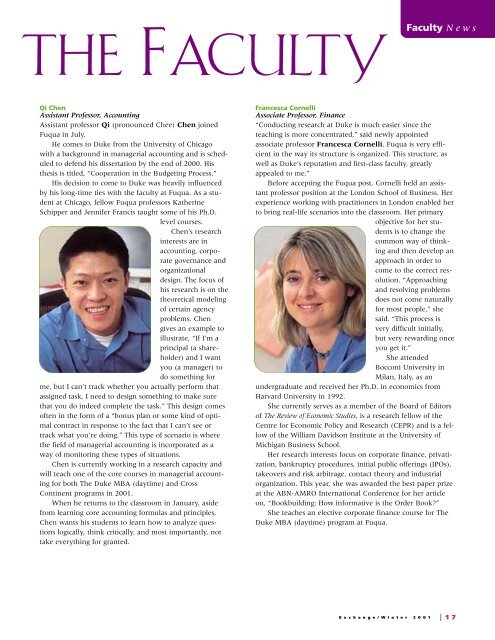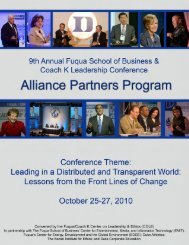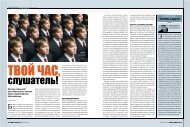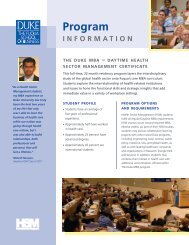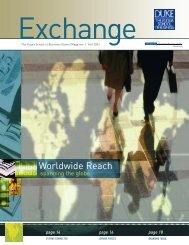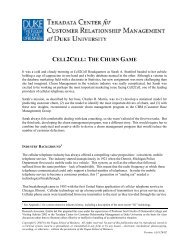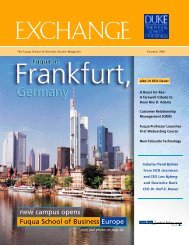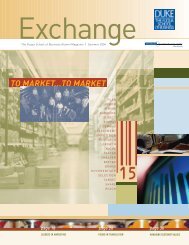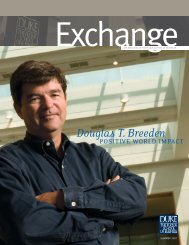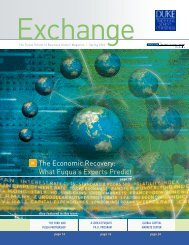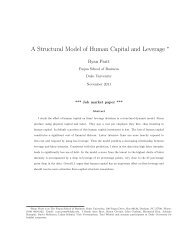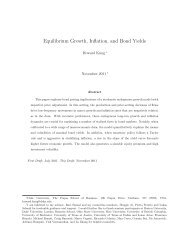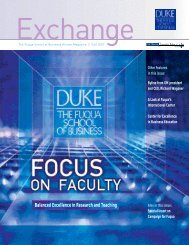A l u m n i M a g a z i n e - Duke University's Fuqua School of Business
A l u m n i M a g a z i n e - Duke University's Fuqua School of Business
A l u m n i M a g a z i n e - Duke University's Fuqua School of Business
Create successful ePaper yourself
Turn your PDF publications into a flip-book with our unique Google optimized e-Paper software.
the Faculty<br />
Qi Chen<br />
Assistant Pr<strong>of</strong>essor, Accounting<br />
Assistant pr<strong>of</strong>essor Qi (pronounced Chee) Chen joined<br />
<strong>Fuqua</strong> in July.<br />
He comes to <strong>Duke</strong> from the University <strong>of</strong> Chicago<br />
with a background in managerial accounting and is scheduled<br />
to defend his dissertation by the end <strong>of</strong> 2000. His<br />
thesis is titled, “Cooperation in the Budgeting Process.”<br />
His decision to come to <strong>Duke</strong> was heavily influenced<br />
by his long-time ties with the faculty at <strong>Fuqua</strong>. As a student<br />
at Chicago, fellow <strong>Fuqua</strong> pr<strong>of</strong>essors Katherine<br />
Schipper and Jennifer Francis taught some <strong>of</strong> his Ph.D.<br />
level courses.<br />
Chen’s research<br />
interests are in<br />
accounting, corporate<br />
governance and<br />
organizational<br />
design. The focus <strong>of</strong><br />
his research is on the<br />
theoretical modeling<br />
<strong>of</strong> certain agency<br />
problems. Chen<br />
gives an example to<br />
illustrate, “If I’m a<br />
principal (a shareholder)<br />
and I want<br />
you (a manager) to<br />
do something for<br />
me, but I can’t track whether you actually perform that<br />
assigned task, I need to design something to make sure<br />
that you do indeed complete the task.” This design comes<br />
<strong>of</strong>ten in the form <strong>of</strong> a “bonus plan or some kind <strong>of</strong> optimal<br />
contract in response to the fact that I can’t see or<br />
track what you’re doing.” This type <strong>of</strong> scenario is where<br />
the field <strong>of</strong> managerial accounting is incorporated as a<br />
way <strong>of</strong> monitoring these types <strong>of</strong> situations.<br />
Chen is currently working in a research capacity and<br />
will teach one <strong>of</strong> the core courses in managerial accounting<br />
for both The <strong>Duke</strong> MBA (daytime) and Cross<br />
Continent programs in 2001.<br />
When he returns to the classroom in January, aside<br />
from learning core accounting formulas and principles,<br />
Chen wants his students to learn how to analyze questions<br />
logically, think critically, and most importantly, not<br />
take everything for granted.<br />
Faculty N ews<br />
Francesca Cornelli<br />
Associate Pr<strong>of</strong>essor, Finance<br />
“Conducting research at <strong>Duke</strong> is much easier since the<br />
teaching is more concentrated,” said newly appointed<br />
associate pr<strong>of</strong>essor Francesca Cornelli. <strong>Fuqua</strong> is very efficient<br />
in the way its structure is organized. This structure, as<br />
well as <strong>Duke</strong>’s reputation and first-class faculty, greatly<br />
appealed to me.”<br />
Before accepting the <strong>Fuqua</strong> post, Cornelli held an assistant<br />
pr<strong>of</strong>essor position at the London <strong>School</strong> <strong>of</strong> <strong>Business</strong>. Her<br />
experience working with practitioners in London enabled her<br />
to bring real-life scenarios into the classroom. Her primary<br />
objective for her students<br />
is to change the<br />
common way <strong>of</strong> thinking<br />
and then develop an<br />
approach in order to<br />
come to the correct resolution.<br />
“Approaching<br />
and resolving problems<br />
does not come naturally<br />
for most people,” she<br />
said. “This process is<br />
very difficult initially,<br />
but very rewarding once<br />
you get it.”<br />
She attended<br />
Bocconi University in<br />
Milan, Italy, as an<br />
undergraduate and received her Ph.D. in economics from<br />
Harvard University in 1992.<br />
She currently serves as a member <strong>of</strong> the Board <strong>of</strong> Editors<br />
<strong>of</strong> The Review <strong>of</strong> Economic Studies, is a research fellow <strong>of</strong> the<br />
Centre for Economic Policy and Research (CEPR) and is a fellow<br />
<strong>of</strong> the William Davidson Institute at the University <strong>of</strong><br />
Michigan <strong>Business</strong> <strong>School</strong>.<br />
Her research interests focus on corporate finance, privatization,<br />
bankruptcy procedures, initial public <strong>of</strong>ferings (IPOs),<br />
takeovers and risk arbitrage, contact theory and industrial<br />
organization. This year, she was awarded the best paper prize<br />
at the ABN-AMRO International Conference for her article<br />
on, “Bookbuilding: How informative is the Order Book?”<br />
She teaches an elective corporate finance course for The<br />
<strong>Duke</strong> MBA (daytime) program at <strong>Fuqua</strong>.<br />
E x c h a n g e / W i n t e r 2 0 0 1 I 17


